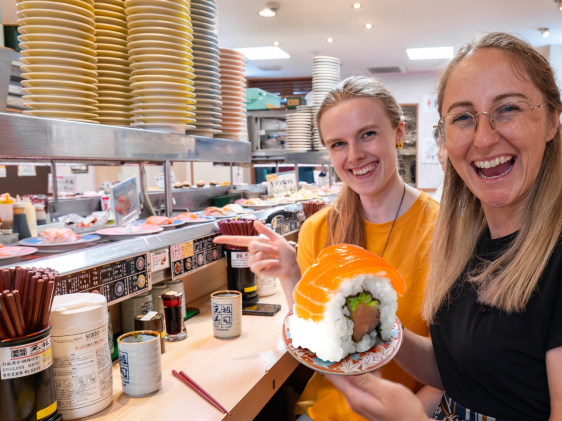Like any language, learning Japanese takes time and dedication. So, here’s a cheapo’s guide to introducing yourself in Japanese. It does not, however, need to cost the earth. One of the best ways to improve your Japanese skills is to practice speaking the language as much as possible, and fortunately, this can be done totally for free.
Of course, in order for that to happen, you need people to speak to. In this post, we’ll go over some basic Japanese phrases that you can use when meeting new people so you can get to know a little bit about them, and turn them into friends with whom you can practice your Japanese speaking skills.

Introducing yourself
When meeting new people, the first things people will likely want to know about you are who you are, where you are from, and what you do. Below are the key phrases needed to talk and ask about these things:
English (E): Nice to meet you
Japanese (J): hajimemashite
E: My name is [John]
J: watashi no namae wa [John] desu
E: What is your name?
J: onamae wa nan desu ka?
Depending on the age and character of the person you are asking, they may respond with either their given name or their surname. In either case, unless told otherwise, it is best to show respect by adding “san” at the end of their name whenever you refer to them. Remember, however, that this only applies to other people’s names, and never your own.
E: I come from [Singapore]
J: [shingapooru] kara kimashita
E: Where (in Japan) are you from?
J: (nihon no) doko kara kimashita ka?
E: I am a [studemt].
J: watashi wa [gakusei] desu.
E: What do you do? (Literally: What is your job?)
J: oshigoto wa nan desu ka?

Talking about your interests
While any Japanese-speaking person will allow you to practice your language skills, it will be a lot more fun, and therefore a lot more effective, if the people you speak to like the same things you do. The following phrases should help you decide whether or not you’ll enjoy spending time with new people that you meet.
E: What are your hobbies?
J: shumi wa nan desu ka?
E: My hobbies are [basketball] and [piano].
J: watashi no shumi wa [basuke] to [piano] desu
The Japanese word “to” is a particle used to join nouns together in a similar way to the word “and”. If you want to list more than two hobbies, you can do so by simply placing “to” in between each one.
One point to note with the above expression is that the hobbies being described should be expressed as nouns. In both Japanese and English, some hobbies are easily described with just a noun, such as “basketball”, but for some other activities, we need to include a verb that has been turned into a noun, like “reading” or “watching”.
Just as we can convert verbs like “read” and “watch” into the nouns “reading” and “watching” by adding “ing” in English, it is easy to convert verbs to nouns for this purpose in Japanese too. All we need to do is take the verb in its dictionary form and add “koto”, like so:
E: I read books -> Reading books
J: (watashi wa) hon wo yomu -> hon wo yomu koto
E: I watch movies -> Watching movies
J: (watashi wa) eiga wo miru -> eiga wo miru koto
These can then be used in sentences like other nouns, such as the above sentence used to describe our hobbies:
E: My hobby is reading books
J: watashi no shumi wa hon wo yomu koto desu
E: My hobby is watching movies
J: watashi no shumi wa eiga wo miru koto desu
Like other nouns, these can also be combined using the particle “to”, as shown below:
E: My hobbies are listening to music and watching soccer.
J: watashi no shumi wa ongaku wo kiku koto to sakkā wo miru koto desu
The advantage of expressions like these is that you can use verbs exactly as they appear in the dictionary.

There is no limit to the number of things you can talk about when meeting someone for the first time, but hopefully these phrases will be enough to help you start a new friendship or two, giving you a fun and effective way to improve your Japanese skills. By combining regular, natural speaking practice with some time spent studying the fundamentals of the Japanese language using a resource like my book 80/20 Japanese, you can quickly improve your Japanese without breaking the bank.






























